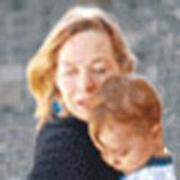Laid up: Between whiskey and credit
Paylaş
Sometimes, like now, life lays us out flat. Ok, it’s not entirely my kid’s fault, but rather a few days of hauling his stroller around cold London, seeking remedy in a smiling Chinese woman with a sadistic massage technique and working late nights upon return. This morning without warning, buildings I didn’t know existed at the base of my back collapsed as I reached for the wet wipes.
Now, for the second time in his year and a half of life, I’m lying here unable to move or care for my child. The babysitter came fast so little Max didn’t have a chance to turn the stove dials, filling the house with glee and gas by as I lie here prone.
In this current immobile state, I spent the day reading what was in arm’s reach. Naomi Klein’s chilling book "The Shock Doctrine" recasts the emergence of free market capitalism as a patient plan to obliterate the senses in order to set its policies in motion: Think post-9/11 unencumbered torture begetting more hatred and war in Iraq, Hurricane Katrina’s "cleansing" the city of its poor and South East Asia’s beachfront development of resorts where villages had been. Free market success, Milton Friedman explained in so many words, relies on chaos when people have lost sense of their rights and will submit to free market principles that obliterate safeguards for a balance of wealth and funding for health and education. Friedman’s last article before he died in 2006 said Katrina had given
Wealthy addiction booming
A couple of magazine pieces were also within grasp: One in the New Yorker was about a guy making the most of an upturn of wealthy people seeking drug abuse treatment and the other in Harper’s was about a guy whose business cleaning out foreclosed houses was booming. Both reveal the state of our chaos, but the latter was an intimate portrait of people whose lives had just been emptied - as wealthy addicts get wealthier.
While in
But between muscle relaxers and sips of whiskey, one could view Klein’s diligent dissection as a prescient look at the good that comes from being knocked flat on our backs, unable to move economically. I can’t help thinking that this crisis might be the end of (a) history, to turn Francis Fukuyama’s famous free market book title on its head. Now we have that rare opportunity to rebuild an economy that is better and fairer, with leaner habits and more safeguards for people who need them most.
The economic woes don't have to destroy us: We should recognize new chances - and good riddance. For example, I imagined Max's free will and crayons running loose on our walls just before gassing up the place. In my shock and confinement, I knew this was a lifechanger, and it had to be the beginning of getting strong again from the core. In a moment of confluence as I was writing this, Max found my wallet and emptied my credit cards into the toilet. Now, that’s the kind of policy change I’m talking about, son. Happy New year.
Paylaş








